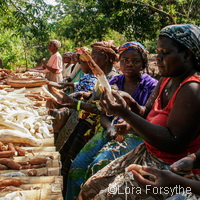EU funds research to create a better life for African farmers
An EU-funded project is set to help African farmers boost their livelihoods. Scientists at the University of Greenwich are leading the EUR 3.2 million research project titled 'The Cassava Growth Markets Project' (CassavaGMarkets) which was launched at the University's Natural Resources Institute. The aim is to generate the knowledge to empower smallholder cassava farmers to increase productivity, gain access to new markets and generate a stable income. The project is mainly funded by the European Commission's 'Food Security Thematic Programme' (FSTP). Research organisations from Ghana, India, Malawi, Nigeria, Tanzania, Uganda and the United Kingdom have come together in an international partnership to carry out the work. Cassava is an essential crop for millions of people in Africa as it can be grown all year round. It is the third most important source of calories in the tropics, after rice and maize. It thrives better in poor soils and can withstand drought, providing valuable food in periods when other crops are not available. It is grown by poor farmers, many of them women, often on marginal land. For these people and their families, cassava is vital for both food security and income generation. As well as Africa, this crop is crucial to around 500 million people around the world. Cassava's starchy roots produce more food energy per unit of land than any other staple crop. It is comparable to potatoes, although it has twice the fibre content and a higher level of potassium, as well as being rich in carbohydrates, calcium, and vitamins B and C. Its leaves, often eaten as a vegetable, also provide essential vitamins. The plant is also known to have medicinal qualities as the leaves and bark can be used to treat hypertension, headache, pain and irritable bowel syndrome. As cassava is a gluten-free, natural starch, it is also used in western cuisine as a wheat alternative for sufferers of coeliac disease. The project will also focus on improvements to high-quality cassava flour and related products, which will enable smallholder farmers to benefit from improved markets for their produce in a more environmentally friendly and sustainable way. Also assessed will be the impact of climate change on cassava value chains and researching the cassava brown streak disease, which leads to large reductions in the productivity of affected communities. It will also investigate improvements to processing techniques that will improve profitability, and examine opportunities for sustained market growth. Professor Andrew Westby, Director of the Natural Resources Institute, says: 'We are delighted to start this important new project with our partners in sub-Saharan Africa and India. It addresses some of the fundamental challenges facing smallholder farmers as they develop new markets for one of their most important crops, cassava.' The Natural Resources Institute, based at the University's Medway Campus, is also involved in several other large international projects, funded by the European Commission and the Bill and Melinda Gates Foundation, to improve the livelihoods of smallholder households in Africa which rely on tropical root and tuber crops. In addition, Professor Keith Tomlins of the Natural Resources Institute has recently been elected as the new President of the International Society for Tropical Root Crops (ISTRC), the only forum in the world for bringing together root and tuber crop scientists and researchers under the same roof. //CPA For more information, please visit: Natural Resources Institute: http://www.nri.org/(opens in new window)
Countries
United Kingdom



